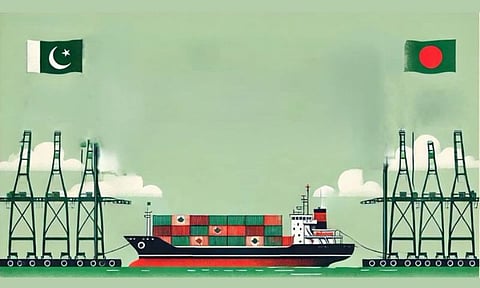

Bangladesh’s Chittagong port received an unexpected visitor a cargo ship from Karachi marking the first docking of its kind since Bangladesh's liberation in 1971. Pakistani High Commissioner to Dhaka, Syed Ahmed Maroof, hailed this as a significant step toward strengthening bilateral trade between Pakistan and Bangladesh.
However, this development is far from a simple step toward thriving trade relations. For India, it raises significant strategic concerns. What was previously perceived as a two-front challenge involving the China-Pakistan nexus has evolved into a more complex situation. Now, India faces an adversarial presence on both its western and eastern borders—Pakistan on one side and an increasingly Islamist-leaning Bangladesh on the other—amplifying vulnerabilities in the Bay of Bengal region.
The departure of Sheikh Hasina has ushered in a new reality for India in the region. Hasina was known for her alignment with India’s security interests, implementing stringent measures against Islamists and militants in Bangladesh. In contrast, the current regime, led by Muhammad Yunus and supported by Western powers and Islamist factions, represents a stark departure from her policies.
Since Hasina’s abrupt exit, Bangladesh-Pakistan relations have reached unprecedented levels of cooperation. Observers note parallels between present-day Bangladesh and the pre-1971 era when Islamist collaborators of Pakistan held sway in the region. Groups like the Razakars, a paramilitary force backed by the Pakistani Army, were notorious for their atrocities during the 1971 war, including genocide, operating concentration camps, and using rape as a weapon of war against Bengalis. The pro-liberation forces, with India’s backing, brought an end to this dark chapter, paving the way for what was hoped to be a secular and progressive Bangladesh.
The shift in Bangladesh’s political landscape suggests a troubling return to old dynamics, posing new challenges for India in its immediate neighborhood.
